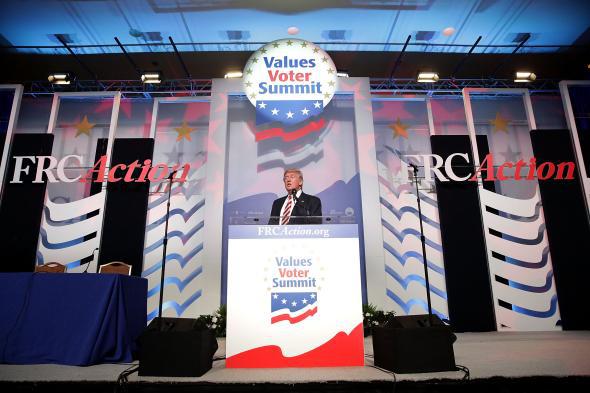During his speech to the Values Voter Summit in Washington on Friday, Donald Trump managed to quote from the bible without embarrassing himself as he has in the past. (See: Corinthians, Two.) The GOP nominee proved far less fluent when talking about the so-called Johnson Amendment, a provision in the U.S. tax code that his Christian conservative crowd loathes and that Trump has promised to repeal if elected president.
In his prepared remarks, released to the press, the amendment—which prohibits tax-exempt organizations from endorsing or opposing political candidates—earned an early, albeit brief mention:
The Johnson Amendment has blocked our pastors from speaking their minds from their own pulpit. If they do speak out, they are punished with the loss of their tax-exempt status. All religious leaders should be able to freely express their thoughts and feelings on religious matters, and I will repeal the Johnson Amendment if I am elected President.
That’s an oversimplification, but it’s generally accurate. Among other things, the Johnson amendment conditions churches’ tax-exempt status on ministers refraining from political speech at their pulpits. Trump, however, is not one to stick to the script when he believes he can squeeze out a little more applause from the crowd. And so he decided to toss in a few Trumpian asides and trademark flourishes during his actual speech. The end result, you will not be shocked to learn, badly butchers the specifics of the law he is promising to repeal:
The Johnson Amendment has blocked our pastors and ministers and others from speaking their minds from their own pulpits. If they want to talk about Christianity, if they want to preach, if they want to talk about politics, they are unable to do so. If they want to do it, they take a tremendous risk, that they lose their tax-exempt status. All religious leaders should be able to freely express their thoughts and feelings on religious matters. And I will repeal the Johnson Amendment if I am elected your president. I promise. So important. Thank you. So important.
OK, first things first: In the reality that exists outside Trump’s speeches, pastors are indeed allowed to “talk about Christianity” and “to preach.” It is, after all, what pastors do. But even if we dismiss that portion of Trump’s response as a candidate stumbling over his words—and it’s not clear we should, given how he’s spoken about the amendment in the past—the story Trump subsequently told to illustrate the alleged problem suggests he either misunderstands or is willfully misrepresenting the scope of the amendment he is promising to end:
This started in a building of mine in Manhattan. I had 50 pastors in a big conference room. And we actually had 50 pastors, two rabbis, a couple of priests—we were all talking and we were there for two hours. And at the end, it was a love-fest. We all agreed. It was like a love-fest. …. And I said to them, I’d love your support. … And I know they wanted to give me their total support, 100 percent. Just like I had in the primaries. And I said, “I really would like your support.” And they didn’t really know what I was talking about. And I said, “What’s going on here?” They said, “Well, sir, we can’t do that because we would be violating the laws.”
And I said, “What’s the punishment?” “Well, we could lose our tax exempt status,” which of course is a massive penalty. I said, “Tell me about this.” And we sat down. They talked about it. … So we were looking down on to the sidewalk and there were people walking on the sidewalk. I said, “So, folks, what you’re telling me is those people walking way, way down there on the sidewalk have really more power than you do because they’re allowed to express their feelings and thoughts openly and without penalty?” … They looked at me and they said, “That’s actually right. They have more power than we do. We’re not allowed to express.”
In Trump’s one-man play, these unnamed pastors were eager to speak out in support of Trump, but Big Government barred them from doing so. But as Arizona State University law professor Adam Chodorow explained in Slate earlier this summer (in a piece arguing that it would be dangerous to repeal the Johnson Amendment), religious leaders are free to engage in political speech as long as it’s not from the pulpit. Indeed, many have made endorsements and spoken out politically in this election, as they have in years past. Take for instance Mark Burns, the pastor who kicked off the RNC by declaring Hillary Clinton to be the enemy, or Wayne Jackson, who recently hosted Trump at his Detroit church. If those 50-odd unnamed religious leaders Trump says took part in the Trump Tower “love-fest” wanted to publicly support the GOP nominee, the Johnson Amendment doesn’t stop them from doing so.
